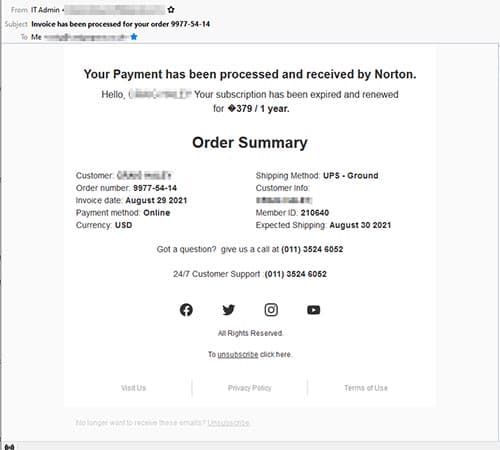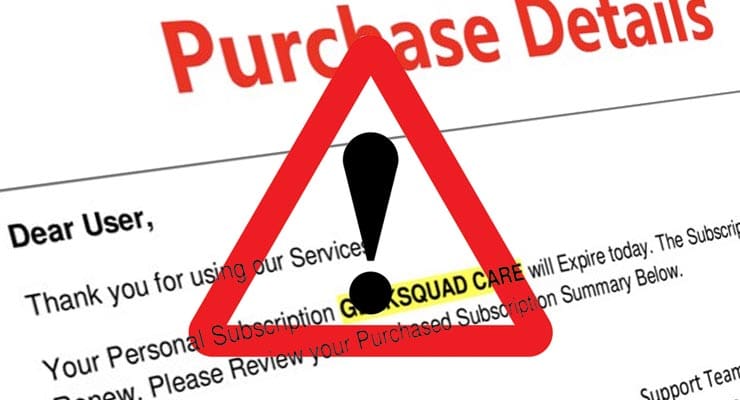Beware “call to cancel” email scams claiming you’ve been billed for a product
Have you just received an unexpected confirmation email come through to your inbox confirming a recent purchase… only it’s for a purchase that you never actually made?
For example, have you received an email confirming your subscription to a company you’ve heard of but never actually purchased anything from? If so, then it could be a “call to cancel” scam. And we explain how it works.
The first part of the scam is the unexpected arrive of an email which claims to be a confirmation email for a recent purchase the recipient has made. Take the below email, for example. This email claims to be confirming a purchase of a Norton Antivirus subscription.

In a similar fashion the below email thanks the recipient for their recent purchase of Geek Squad Care.

Like many similar scams that arrive through email, this scam is essentially a bluff. And by that we mean the recipient actually hasn’t been billed for anything.
But of course the crooks behind these emails are hoping the recipient doesn’t check with their bank. Instead, the crooks are hoping the recipient gets angry or flustered. Perhaps even flustered enough to call up, say, the handy support phone number on the email in order to get the charge cancelled.
And that, folks, is the trap. The support phone number – a phone number you’ll notice is very easily noticeable on both of the above email examples – will actually connect the victim to a call centre operated by a criminal network of online scammers.
Sponsored Content. Continued below...
And those people fooled into calling the number can potentially fall prey to any number of different scams. This can include being tricked into handing over sensitive financial information under the false pretence of getting a refund, or being tricked into downloading malware disguised as “cancellation forms” or “refund forms”.
The salient point here being that if you call these phone numbers, the crooks on the other end of the line will do anything in their playbook to scam you.
The scam works on the notion that most of us would be quite rightly alarmed – and angry – to see an email arrive telling us that a company has billed us for something we’ve never asked for or wanted. And as such, in the midst of that anger and alarm, we make ourselves vulnerable to compromising our own privacy and security.
If you do get these “you’ve been billed” emails, the best course of action isn’t to reply, or to click any links they may contain, and certainly not to call any support phone numbers on the email. Just hit the DELETE button.
Sponsored Content. Continued below...
If there is a tiny part of you that thinks “what if” the email is genuine and I have been billed for something, you can always check directly with your bank and go from there.
But in the meantime, some red flags that may give these emails away as scams can include
- A lack of personal information, such as your name. Instead these scam emails often use generic greetings like “User” or “Customer”.
- Poor spelling and grammar.
- The email will try and emphasis their support phone number which you can call “to cancel”.
And if you’re not sure, always ask for help from someone you trust before going any further.
Continued below...
Thanks for reading, we hope this article helped, but before you leave us for greener pastures, please help us out.
We're hoping to be totally ad-free by 2025 - after all, no one likes online adverts, and all they do is get in the way and slow everything down. But of course we still have fees and costs to pay, so please, please consider becoming a Facebook supporter! It costs only 0.99p (~$1.30) a month (you can stop at any time) and ensures we can still keep posting Cybersecurity themed content to help keep our communities safe and scam-free. You can subscribe here
Remember, we're active on social media - so follow us on Facebook, Bluesky, Instagram and X
